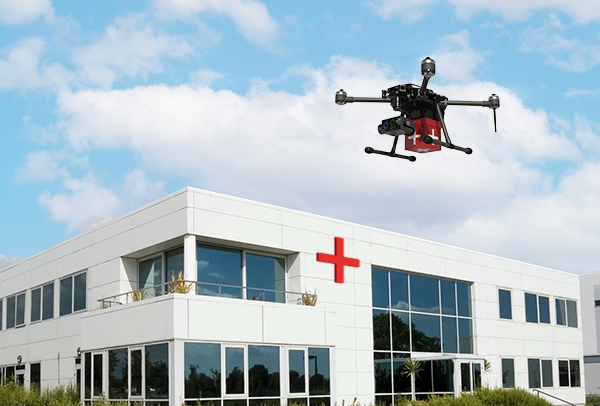Drones in Healthcare: A Lifesaving Innovation
Read 7-8 minutes approx

Introduction to Drones Across Industries
Drones have become a common presence in various industries, such as agriculture,
surveying, mapping, mining, electrical, defence, disaster management, photography,
and videography. However, their potential in the healthcare sector remains relatively
unexplored. In this blog, we will explore the role of drones in healthcare and how they
are poised to revolutionize the industry.
Drones in Healthcare: An Untapped Potential
UAV technology has reached a point where it is on the verge of making significant
contributions to the healthcare sector. While the use of drones in healthcare is still in its
infancy, its potential is immense. Drones are poised to become one of the fastest-
growing technologies in the healthcare industry, offering a wide range of applications.
These applications include real-time data provision, patient monitoring, enhancing the
quality of care, and even drug transportation. Hospitals have started utilizing drones to
deliver medical supplies to remote and rural areas. Additionally, medical professionals
are discovering that drones can aid in more accurate disease diagnosis. It has the
potential to address some of the most challenging healthcare issues, such as providing
medical assistance during disasters and transporting organs for transplantation.
Ultimately, drones could make daily healthcare procedures safer, more convenient, and
cost-effective.
Drones in Healthcare: Fastest-Growing Technology
The commercial use of UAVs has attracted significant attention in today's world, and
they represent one of the technological innovations in the medical field. Drones, also
known as Unmanned Aerial Vehicles (UAVs), hold the potential to speed up the secure
delivery of critical medications, drugs, and vaccines, bypassing ground infrastructure
disruptions, especially in disaster scenarios.
Flight Control and Autonomous Capabilities
Now, let's dive into the exciting realm of flight control. You can either take the reins manually through remote controllers, making real-time adjustments and capturing stunning aerial shots with precision. Or, you can let your drone show off its autonomous capabilities by following pre-programmed flight paths. That's
In addition to delivering essential supplies during disasters, these are being employed to
transport medicines and vaccines to remote areas lacking proper road infrastructure. The
future of drone use in healthcare is promising, prompting questions about how the
industry can harness this technology to enhance safety and care delivery. Drones have
already been trailed for delivering food aid and medical supplies to disaster-affected
regions. India, with its vast territory, challenging terrain, and significant healthcare
disparities, has also recognized the necessity of integrating UAVs delivery solutions.
Initiatives like "Medicine from the Sky," a partnership between the World Economic
Forum, the State Government of Telangana, and Apollo Hospitals in India, have
facilitated and scaled up drone-based medical deliveries in the region.
Global Insights into the Medical Drone Market
Let's delve into global insights into the medical drone market based on its industry
applications. According to a report by Global Market Insights, the Medical Drones Market
was valued at approximately INR 643 crores (USD 88.2 million) in 2018 and is expected
to reach around INR 2908 crores (USD 399 million) by 2025.
Innovative Applications of Drones in Healthcare
Now, let's explore the top five ways in which drones have been successfully implemented in healthcare:
1. Medication Delivery: In August 2017, a drone was employed to transport anti-venom serum over a distance of 700 miles in just 20 minutes.
2. Tumour Scanning: UAVs equipped with infrared cameras enable doctors to scan patients for tumour without invasive procedures or harmful radiation exposure.
3. 3D Biopsies: 3D biopsies provide a non-invasive method for extracting tissue samples for cancer detection, eliminating the need for needle-based procedures.
4. Blood Flow Tracking: During surgery, surgeons can use drones to trace blood flow around organs and tumour, enhancing surgical precision.
5. Aerial Imaging: Aerial images captured by UAVs aid doctors during surgery, allowing them to visualize organ connectivity and identify potential issues for post-operative recovery.
Regulatory and Technical Challenges:
In India, the Directorate General of Civil Aviation (DGCA) issued guidelines categorizing
drones into four classes based on weight, mandating Unique Identification Numbers
(UIN) for drone registration. Additionally, all civilian UAV operations above 200 feet in
uncontrolled airspace require an Unmanned Aircraft Operator Permit (UAOP) from the
DGCA, with restricted operations in controlled airspace. Several technical challenges
must be addressed to ensure the success of medical drone deliveries, including
limitations on drone size, range, payload capacity, take-off, and landing permissions.
Security concerns, such as hacking and hijacking, also pose significant risks. Addressing
these challenges will require collaborative efforts among governments, public health
organizations, and the private sector to formulate and implement policies that ensure
the secure and timely delivery of critical medicines and vaccines where they are needed
most.
Indo Wings - A Leading Solution in Medical Drone Deliveries:
To address these challenges and further advance the use of drones in healthcare, Indo
Wings is at the forefront. It offers cutting-edge solutions and expertise in medical drone
deliveries. With a commitment to improving healthcare access and delivery, has
positioned itself as a leading player in the field. Through innovation, collaboration, and
adherence to regulatory standards, dedicated to ensure that UAVs become a reliable and
efficient means of delivering critical medical supplies to those in need. As we continue to
witness the transformative potential of drones in healthcare, Indo Wings stands as a
testament to the industry's capacity to adapt and thrive in the face of evolving
challenges and opportunities. Together, with the support of governments, public health
organizations, and private sector partners, Indo Wings and similar pioneering companies
can pave the way for a brighter, healthier future through medical drone deliveries.
Back to all Blog